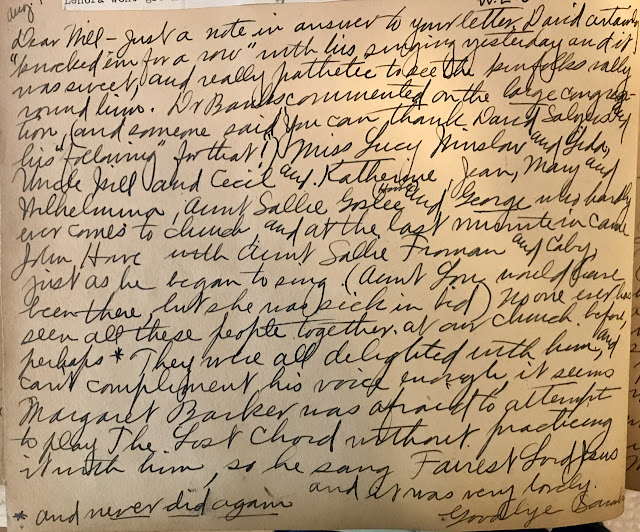Sarah's Malaise
In 1932, Sarah Eva Howe Salyers was approaching 50 years of age and apparently feeling the stress of housekeeping, cooking, and providing for her family on a shoestring budget. (Remember that three of her four children, who ranged in age from 18 to 26, lived at home – a common situation during the Depression.)
Will, whose job required regional travel, wrote to Sarah, urging her to get more rest. At some point, Will convinced her to take a break from her responsibilities in Lexington and visit their home town of Carrollton. She stayed in Carrollton a few weeks, reconnecting with friends and relatives. I can imagine how much fun she had! Sarah had been involved in many church and community organizations when she lived in Carrollton. She was respected and popular. She pasted into a scrapbook this picture taken during her visit:
 | ||
| Sarah Eva Howe Salyers (center) with relatives and friends during her visit to Carrollton, circa 1933 |
"Let us be gay"'s our motto
Fun and frolic galore –
We sit entranced –
bask in her smiles –
Sally's with us once more.
The trip must have been the tonic Sarah needed. I see no mention in the next few scrapbooks that she endured fatigue or headaches after her return.
Mary Alice's New Beau
On a summer Sunday in 1933, Mary Alice's friends Virginia Nevins and Bill Shafer introduced her to a young man from Falmouth. His name was Lawrence Colvin. Lawrence was a farmer and beekeeper who sold honey. The scrapbooks include several letters Lawrence wrote to Mary Alice. The letters are delightful to read and never end without compliments to the recipient and comments on the fun Lawrence had when he was with her.
Lawrence sent this letter from the Chicago World's Fair, where he went with others to learn about the latest approaches in agriculture. I include it here because it offers insight into the life and times of the era. A partial transcription follows the image.
Among the most interesting of Lawrence's observations:
I spent Tue[sday] and Wed[nesday] at the fair. I suppose that I had expected too much for I was disappointed in many of the exhibits. Ripley's Odditorium is a collection of freakish people and of people who seem to enjoy torture. I am sure that most of the acts hurt me more than it did them. For an example one man lifts a heavy weight by a hook pushed through a hole in his tongue.(Lawrence sounded serious about Mary Alice in his letters, but I have yet to find any evidence that she was serious about him. By the mid-1930s she had met a young man named Richard Allen Hays, who lived in Anchorage in Jefferson County. She married him in 1939.)
They say that a visit to the hall of science is worth a year in college but one would have to go to college twn years in order to understand it. A lecture on "The Use of Silicon and Maganese [sic] Briquets in the Cupola" left me leaning weakly against the railing. As soon as I had recovered sufficiently I left. I went to the Chicago Theater this afternoon. I saw Sally Rand in her famous fan dance, Joseph Chemavsky and his orchestra, and Cab Calloway."
Lawrence went on to write that Calloway "leads his band with a vigourous manner dancing up and down the stage much of the time, and occasionally bursting forth in his famous 'hi-de-ho.'"
Music!
Music was a major form of entertainment for members of the Salyers family in the 1930s. Some of them played instruments, some of them sang, and all of them listened to music either on the radio or in live performances. The scrapbooks are full of references, and many of those references in the mid-1930s were about the youngest of Sarah's four children. David was known for his singing, both when he was a child in Carrollton and later in high school and college. A proud Sarah wrote to her husband (as usual, working out of town) about their son's performance at the Methodist church. A partial transcription, complete with Sarah's footnote, follows the image. The names she lists are Sarah's Carrollton relatives who traveled to Lexington for the performance.
Dr. Banks [the pastor] commented on the large congregation (and someone said 'You can thank David Salyers and his following for that!"). Miss Lucy Winslow and Lida, Uncle Will and Cecil and Katherine Howe, Jean, Mary and Wilhelmina, Aunt Sallie Goslee and George who hardly ever comes to church, and at the last minute in came John Howe with Aunt Sallie Froman and Caby, just as [David] began to sing. . . . No one ever has seen all these people together at our church before, perhaps.* They were all delighted with him and can't compliment his voice enough, it seems.
*And never did again.
David and his voice were in high demand. He sang at weddings, funerals, and other special occasions, and he performed in many stage productions, both at Henry Clay High School and at the University of Kentucky. A page in this event program from February 1933 lists David as the lead in "Iolanthe," a Gilbert and Sullivan opera staged by Henry Clay High School.
The scrapbooks for the 1930s are full of programs from musical events at the University of Kentucky, Lexington churches and auditoriums, and other locations. There are also many clippings about movies that played at the Kentucky, the Grand, and other Lexington theaters. I don't know how many movies the Salyers family members attended, because the 25-cent admission was more than the cost of a hot meal in a local cafeteria. Still, ads like this one for a 1932 production are fun to see.
Over the next few posts, we'll explore more about the 1930s in Carrollton, Lexington, and other places in Kentucky. Depression or no Depression, those were lively times!





No comments:
Post a Comment